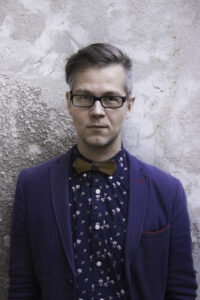Media Library
Interview with JACEK DEHNEL
Queer-Bodied Voices
Ricardo Domeneck: Do we write differently as queer-bodied people living in our specific societies, which deal in specific manners with queer-bodied people? Can we speak of a queer-bodied poetics? How do you deal with this question?
Jacek Dehnel: I don’t perceive myself as a queer-‘bodied’ person. Sure, my body could be called “queer” because of some of its unusual characteristics or medical conditions (as any body, I guess), but as far as my nonheteronormative identity is concerned, I do not really perceive it as a body aspect. I see my personal experience of being – broadly speaking – queer, which is limited to being a gay cis-man, mostly as something related to my emotions, my relationships, my place within the society.
Of course there is a LGBT literature or, in my case, gay literature and gay writers. But I see a distinction between gay literature (which focuses on the gay experience and doesn’t have to be written necessarily by a gay person, like “Days Without End” by Sebastian Barry) and literature written by gay people, which doesn’t have to focus on this part of their experience. We also have writers who join one with another, like Edmund White, Jeannette Winterson or Alan Hollinghurst. But for me being gay does not mean I have to limit myself to those subjects, so only in some of my works they are featured directly.
However, I do think that all my writing is influenced by the experience of being an outsider, an outcast. Hence my interest in protagonists who are in some way excluded: in victims, in the less fortunate, in people perceived as mad. Also: in those historical figures who are not in the limelight, but somewhere around: forgotten, frowned upon, well hidden as not worthy of occupying a place in history.
Ricardo Domeneck: Is the idea of a “queer tradition” important to you? Do you read and deal in a different way with your contemporary queer poets, as you do with homoerotic poetry from the past? Can you relate to poets such as Gertrude Stein and Oscar Wilde, to give two famous examples, from a time when language functioned differently, when “queer” meant something else?
Jacek Dehnel: It was definitely important in my formative years; growing as a teenager in Poland in 1990s I obviously had no language to speak about my identity, so I craved for anything that would help me out. Be it Thomas Mann’s “Buddenbrooks”, “Tonio Kroeger” and “Death in Venice” (filtered through Luchino Visconti, obviously), be it Arthur Rimbaud and Paul Verlaine (filtered through Agnieszka Holland’s “Total Eclipse”), be it Marcel Proust, be it bits and pieces in books by Jarosław Iwaszkiewicz and Witold Gombrowicz (or even straight authors, like Joris-Karl Huysman’s “À rebours”) – I devoured all of that. Then, of course, both the Polish book market and film productions changed and I had a broader access to foreign literature in English. Now, being in my early forties, I am just looking for great books or movies, but I do not need the queer tradition to build my own identity or my language anymore.
Ricardo Domeneck: What intersectionality guides your work? How do notions of “national language”, “citizenship”, “national and ethnic identities” intersect with queerness for you?

Jacek Dehnel: For many years Poland has been the second most homophobic country in EU, but recently it won the gold. And by that I mean more “the state” than “the society”, which is actually getting slowly more and more tolerant and is more progressive than the political class, in particular the ruling party and the Catholic church. Obviously it influences my everyday life in many ways. It was also the reason why we have decided with my husband to stay in Berlin rather than come back to Poland after my one year DAAD art residency here. Living abroad, especially in a long run, should it come to that, undoubtedly influences the writer’s language.
Nevertheless, my activism is less visible in my books, than in my public life: articles and columns that I publish in Poland and abroad, my social media activity, etc. (which often intersects, as some of the pieces I write for Facebook are then published in media at home and abroad). It has to be taken in the account that this activity takes more and more time and isn’t really intellectually challenging. Being a gay person in a homophobic state means that you have to constantly state the obvious (or, as a Polish saying goes, is “proving you are not a camel”): no, we don’t have a gay agenda to destroy a family, no, we do not want to harm your kids, no, gay people are not guided by the Satan, no, homosexuality is not an evil invention of the rotten West, etc. It is needed, but at the same boring, like cleaning a common room in which half of the guests came with muddy shoes on.
I understand, however, that my situation is far better than the one of the majority of the Polish LGBT community: I am a man, a cis-person, an adult, an educated member of the creative class, a well-to-do self-employed person who cannot be fired by any kind of employer, living in a stable, long lasting relationship and supported by his legally married (although, obviously, not recognised in Poland) husband, based in a large city of Warsaw and, since recently, in Berlin. All these conditions make me a privileged person and as such I think I am morally obliged to take a stance and be vocal for those who are in many ways silenced or who would risk too much. Therefore as a gay citizen of Poland I am perhaps more busy with helping my community than if I were a writer from a country where LGBT people are less challenged and have already won more equality.
About the project QUEER-BODIED VOICES.
with Jacek Dehnel